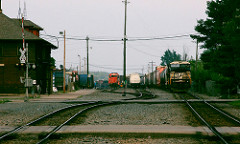Lucas had to work late, or else.
When he left the office
The stars were open
And the bars were closing.
Couples held tight, like
Books and page markers.
He ran to the station
To catch the last ride home.
He was the only passenger—
The last lamb in the dell.
From his window the world
Looked at the far end
Of the telescope—finally
He could sigh and unwend.
He circled a traffic island
Layered with plastic palms.
A troupe of taupe scouts
Wheeled a cannon-sized flashlight
Across Grande Boulevard,
Looking for lost treasure.
The driver parked them
In an alley so she could smoke
And phone her man at Dawn Downs—
“Calliope in the first.”
Had she forgotten Lucas?
No skin off his teeth.
He climbed out and up
To the luggage rack to bask
In moth-eaten lamplight.
He mulled the graffiti:
ARCHIMEDES BATHED HERE.
Him too? Lucas thought. Eureka.
He smelled cinnamon
And looked in time to catch
One auburn curl slipping
The spice peddler’s burnoose
As she dashed through
The baker’s delivery door.
Yesterday will be better,
Lucas whispered, repeating
His mother’s cantra,
Told to him, often, as she wrapped
His bruised head in a bandage
Before applying her slipper
To his ass and send him, gently
Back into the world of pent
And repent. The driver beeped
And they drove through a park
And then off road, down
A path bordered by columns
Of black larches as Lucas hung
To the roof like a breath.
Near dawn she dropped him
On a green, wooden bench
In a kiosk—a bus stop—
In a leafy district. Salut!
Well, this wasn’t home but
Who was Lucas to complain?
Others joined him—
Older folks, elegantly dressed,
Holding leather briefcases
And crocodile clutches.
One man read a yellowing
Newspaper, while a woman spoke
Into a cell phone, shaped
Like a cigarette case:
“They spend all day watching
Cooking shows but only eat
Fast food, which is hard to catch,
Because they’re so slow.”
Lucas nodded off and dreamt
Of apple crisp and sticky buns—
When he awoke, the sun was up
And his fellow travelers
Were queuing to board
A yellow van. He joined the line,
But was stopped at the door
By a white lab coat
Wielding a clipboard,
“Sorry,” she said. “This
Is for patients, well—natives,
As we call them.” She zapped
The van’s emblem with her laser
Pointer: Arbor Days.
Behind them, atop a hillock
Was the rest home, pink
Like a fairy castle
Made from antiseptic cakes.
“This kiosk’s a replica
To trap errant patients—natives,
Who are trying to escape
Into their old lives.
They don’t remember
Their names or what they ate
For breakfast, but they know
That a bus stop brings you
Home. By the time
We return them to Arbor Days
They’ll have forgotten why
They ever wanted to leave us.”
The van pulled away.
Lucas sat down to wait
For a ferry or a coach
Or maybe a small zeppelin.
This was a workday. Someone
Was surely coming for him.
Peter Jay Shippy is the author of Thieves’ Latin, Alphaville, and How to Build the Ghost in Your Attic.
Click here to purchase Issue 03



